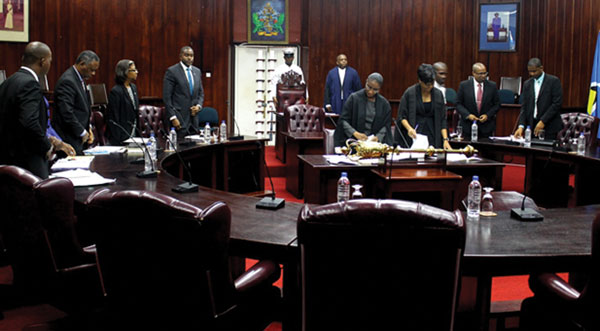TODAY’S opening of a brand new Session of Parliament will be attended with all the usual pomp and ceremony with much public focus, not only on the $1.4 Billion budget but also on who is to be the new Speaker of the House of Assembly.
The figures for Estimates of Revenue and Expenditure over the next financial year will be among the highest on record, likewise the amount to be borrowed.
The two parliamentary parties will hem and haw over the facts and figures and MPs will make the usual play for more attention to their constituencies.
Indeed, apart from the new Governor General Sir Neville Cenac delivering his first Throne Speech, nothing new is expected, the format for the budget debate having gone through so many changes according to which party is in office.
MPs may take new approaches to how they make their cases or debate the proposed figures, but general public interest will be more in what the figures will mean for their respective constituencies, communities and households – and most of all responses to the perennial question: ‘What’s in it for me?’
One thing that hasn’t changed over the years is how much the public gets to know beforehand of what is being budgeted for the upcoming financial year.
MPs, who matter most in the debate, have grown accustomed to getting the voluminous related documents at the last possible minute, as each government always tries its best not to give the Opposition too much headway by way of real information ahead of the debate.
In the process, citizens – who matter most of all – have to wait until those aspects of the debate that are broadcast publicly to know exactly what’s being proposed – and what’s being opposed.
Barring radically unforeseen circumstances, the size of the government side’s current majority basically assures it that its proposals will pass – with whatever amendments or changes the Finance Minister may approve to be supported by the government side.
The opposition will therefore be entering the debate with the hope of influencing whatever changes it can, even without high expectations.
The selection of the next Speaker is as secret an endeavor as putting together the budget package.
Saint Lucia’s own history in that regard since the last General Elections is an interesting one in which, never mind the legal and constitutional requirements for a Deputy Speaker, the House has spent an entire parliamentary year without a Deputy – a situation that posed not only serious visible strain on the last Madam Speaker, but also resulted in the sorry state of affairs in which neither of the two sides has been prepared to yield to fill the position.
The government side named a ruling party MP for the post at the beginning of the term following the June 2016 General Elections, only to quickly withdraw that nominee and the position has remained blank since then, the opposition insisting that it’s the winning side that normally selected a MP from its ranks to do the job and refusing to accept any nomination of anyone from its side by the other.
Whether a Deputy Speaker is essential and whether there are implications for laws passed in the absence of one are questions on the minds of many lay public persons that haven’t been answered. But for today’s session, it is still unclear whether the parties will let the status quo continue and allow the parliament to start another new session without a deputy.
Will it be another woman following in the footsteps of at least three more recent former House Speakers? Which side, if any, will nominate a Deputy?
Nothing either side has said or done suggests there has been any change of mind on their respective parts and it is therefore anyone’s guess what will happen today when the Government side proposes the new Speaker.
It’s now left for the public, in whose name the business of the two Houses of Parliament is conducted, to continue to guess who will be the next person to preside over the conduct of the debate and the business of the House – and whether he or she will have a Deputy.
Fortunately, by the end of this day, all the above unanswered questions will have finally been answered. But wouldn’t it have been better if John and Jane Public didn’t have to wait as long as they have?







With every editorial, the editor of the Voice reveals his juvenile perspective on the state of the St. Lucia and the world-at-large – much like a simpering ‘fashion reporter’ reporting on the latest fashion show!